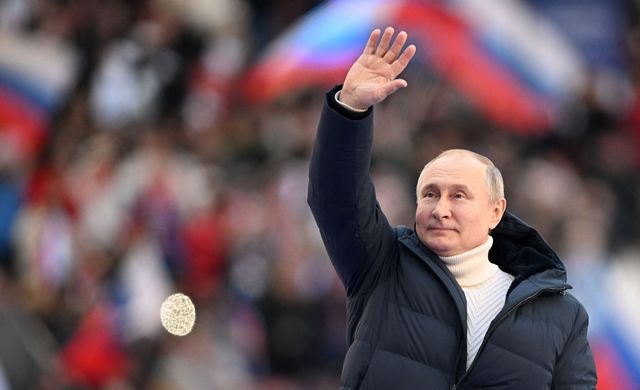Russian Oligarchs Resist American Sanctions With Offshore Accounts, Shell Companies


RAMIL SITDIKOVGetty Images
The sanctions imposed upon Russia in response to that country’s unprovoked attack on Ukraine seem to have given our friends at the International Consortium of Investigative Journalists a chance to do some serious running to daylight. On Monday, working with the Washington Post on the vast treasure trove of leaked documents called the Pandora Papers, the ICIJ has produced a bathysphere exercise into the international financial depths of Russian oligarchs. The Volga Bagmen are only the surface feeders. The real predators cruise the dark depths. From the WaPo:
Financial monitors at one of New York’s most storied banks were watching as hundreds of millions of dollars moved through offshore accounts.
The wire transactions — a dozen in all, totaling more than $700 million — were suspicious enough to officials at Bank of New York Mellon that they submitted a stream of alerts to the U.S. Treasury Department. But the officials seemed completely unaware of who was truly behind the transactions, according to copies of the submitted reports. Even their attempts to track down the companies named on the wire transfers were, in some cases, spectacularly wrong, with one report erroneously linking a $100 million payment to a British merchant that “specializes in the sale of fruits and vegetables.”
I have to believe that $100 million will buy you a shit-ton of beets.
In reality, the shifting funds were part of a vast offshore empire associated with Russian billionaire Suleyman Kerimov. Kerimov is one of Russia’s wealthiest individuals, a political ally of President Vladimir Putin and a member of Russia’s upper house of parliament, representing his native Dagestan. He was first put under sanctions by the United States in 2018. Britain and the European Union followed suit last month as part of a global crackdown in response to Russia’s invasion of Ukraine. But the gaping holes in those bank reports — which now reside in a database maintained by Treasury — underscore how difficult it will be to locate, let alone freeze, assets connected to Kerimov and other Russian elites that have been moved into offshore accounts over the past decade.
Kerimov lives high. He throws parties at which Beyoncé entertains. (Oh, Bey. You can’t need the dough that bad.) He also is a fairly terrible driver, having piled a $650,000 Ferrari into a tree in southern France. (If you’re going to drive like an idiot, buy something reliable from UAZ, dude.)
The ICIJ points us toward a firm called Alpha Consulting, some documents from which were leaked to the ICIJ. They reveal the company’s gifts for hiding things, a useful and profitable skill in this age of economic Cold War.
As is typical in the offshore business, the firm provides so-called nominee directors, or stand-ins, for official corporate paperwork to help shroud shell companies’ actual owners. The company reported in 2019 that its client base was 75% Russian.
Roman Avdeev, a prominent Russian businessman and Alpha Consulting client, began selling radio components and decoders for TV sets in the late 1980s. After the fall of the Soviet Union in late 1991, Avdeev bought Credit Bank of Moscow, a major Russian financial institution. He owns a pharmacy chain and has interests in the construction, timber and oil industries. He also bought the Torpedo Moscow football club in 2017. Forbes lists his wealth at about $1.3 billion as of early April 2022. Credit Bank of Moscow has been under U.S. sanctions since February.
Turns out this unusual business is business as usual, at least for Russian oligarchs. From the ICIJ:
Over the last decade, eight executives at five of Russia’s biggest financial institutions — Sberbank, Alfa Bank, VTB, Gazprombank and VEB — exploited the secrecy of the offshore financial system to stash wealth in faraway jurisdictions, the Pandora Papers reveal. All eight of the bankers were involved in a variety of offshore maneuvers in recent years as Russia’s relationship with the rest of the world became increasingly fraught, the records show.
These previously unreported moves included shifting assets just before or soon after Western nations sanctioned Russian elites and businesses. Some of these sanctions started in 2014 in response to Russia’s seizure of Crimea from Ukraine. Others were added in response to Russia’s cyber activities, its meddling in the 2016 American presidential election and its continuing aggression in Ukraine and Syria.
Three of the bankers, the leaked records show, used offshore shell companies to invest in luxury properties in London and Cyprus. Four others collaborated on offshore companies holding at least $2 billion. The documents also show that Herman Gref — the chief executive of Sberbank, Russia’s biggest bank — used an offshore operative in Singapore in 2015 to restructure a $75 million family trust tied to a tangle of offshore companies.
There may be no way to pry Russia out of the grip of the oligarchs, but there should be a way to knuckle their enablers. Any American citizens, or companies, taking advantage of this system should be subject to severe sanctions themselves. And we should be able to tax the uber rich so they have less money to hide. Either that, or the entire world economy becomes a shell company, and all the world’s wealth ends up in the Caymans.
This content is created and maintained by a third party, and imported onto this page to help users provide their email addresses. You may be able to find more information about this and similar content at piano.io






